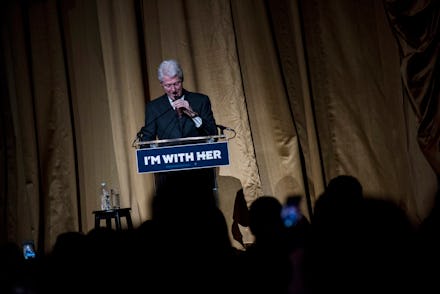Why Bill Clinton Just Tripped Up Hillary in the Worst Way Possible

During this campaign cycle, Hillary Clinton has done an effective, and at times masterful, job presenting herself as having evolved on a number of issues on which the political landscape has changed dramatically since the 1990s.
But her husband's off-the-cuff remarks about black-on-black crime set that agenda back a few steps.
On Thursday, Bill Clinton was delivering remarks to a crowd in Philadelphia on behalf of his wife's presidential campaign when he was repeatedly disrupted by chants from protesters seemingly supportive of the Black Lives Matter movement. (The protesters have since said they support the Black Lives Matter movement, though they are not members of the organization.) They shouted at the former president about his and his wife's past support for the tough 1994 crime law and the 1996 welfare reform law, contending they amounted to an assault on the black community.
Read more: Hillary Clinton Responded to the Black Lives Matter Activist Who Demanded an Apology
Such disruptions during campaign events have been commonplace for the past year, but Bill Clinton chose to respond to them quite differently than his wife generally has. Hillary Clinton typically calmly listens to protesters until they're escorted out, or emphasizes that her positions have changed in accordance with a reduction in the crime rate and a recognition of the tolls of mass incarceration. But a noticeably flustered Bill Clinton assumed a defensive posture.
"I like protesters, but the ones that won't let you answer are afraid of the truth," he said as he asked the protesters to stop chanting.
His response: He then embarked on a defense of his legacy that at times blatantly contradicted the spirit of his wife's 2016 campaign platform on crime and poverty reduction, and advanced a number of strikingly retrograde arguments about the issues.
"You are defending the people who killed the lives you say matter," Bill Clinton said. "Tell the truth. You are defending the people who caused young people to go out and take guns."
He said he and his wife supported the sweeping 1994 crime bill — which the Atlantic notes imposed tougher sentences and broadened use of capital punishment — because gangs were effectively turning children into militia members.
"I don't know how you would characterize the gang leaders who got 13-year-old kids hopped up on crack and sent 'em out onto the street to murder other African-American children," Bill Clinton said. "Maybe you thought they were good citizens. She didn't."
The issue with Bill Clinton's argument on behalf of the crime bill is that it has nothing to do with the protesters' grievances.
The issue with Bill Clinton's argument on behalf of the crime bill is that it has nothing to do with the protesters' grievances. Black Lives Matter isn't ideologically homogenous, but it has never been associated with defending criminal acts or arguing that high crime rates are insignificant. Its central concern is how the state's reaction to crime since the last quarter of the 20th century has been overzealous and wreaked havoc on communities of color.
It is possible for these two ideas to coexist: High crime rates are bad, and responding to high crime rates with an overly punitive criminal justice system is bad. Black Lives Matter — whose most influential proposals center around reforming the criminal justice system, not abolishing it — generally holds both those positions.
Bill Clinton's argument was remarkable because it resurfaces a black-on-black crime black-on-black crime trope that has fallen out of fashion among establishment Democrats in recent years. As the writer Ta-Nehisi Coates has pointed out in the past, it's a rhetorical dodge. "When police killings receive more scrutiny from the people, it is not a 'double standard.' It's a 'standard standard,'" he tweeted in 2014.
Bill Clinton also defended his move to gut welfare during his presidency, saying his tenure saw an enormous drop in African-American poverty. While it's true the booming economy during the 1990s lifted huge numbers of people above the poverty line, there's also evidence his welfare reforms, which included introducing lifetime limits and work requirements, contributed to a long-term spike in extreme poverty. Since the mid-1990, the number of families surviving on less than $2 a day has more than doubled.
Whether it was due to campaign fatigue or ego, Bill Clinton's departure from the script was significant. He seemed uninterested in conceding that some of his positions in the '90s were ultimately conservative, as people in today's political climate are increasingly inclined to believe. If he wants to argue that it was the only way a Democrat could manage to retain power during that era, that's one thing. But arguing for those policies as a progressive today suggests he's out of touch.
April 8, 2016, 6:38 p.m. Eastern: This story has been updated.